新概念第一册第73、74课
新概念第一册Lesson 73 - 74 教学课件

2020/5/15
Read & Learn
'Excuse me,' she said. 'Can you tell me the way to King Street, please?'
1. Excuse me 对不起,打扰一下(通 常在要打扰别人或要打断别人谈话或 要吸引别人注意时使用。)
2020/5/15
The bus went slowly yesterday afternoon and we arrived home late.
Pattern Drills 提问: What did they do this morning?
2020/5/15
They worked very hard this morning.
Written Excercises
1.大部分副词由相应形容词+后缀-ly构成 quick ---> quickly 迅速地 slow ---> slowly 缓慢地 2.以-y结尾的词,把y变i再加-ly happy ---> happily 高兴地 thirsty ---> thirstily 口渴地 3.以-le结尾的词,省去-e再加-y gentle ---> gently 温柔地 possible ---> possibly 可能地 4.以-ic结尾的词加-ally basic ---> basically 基本上 5.以-ll结尾的词只加-y full ---> fully 完全地,充分地
2020/5/15
Read & Learn
• Q: Did the man smile? • A: Yes, he did. • Q: Did the man undertand English? • A: No, he didn't. • Q: What did the man do? • A: He put his hand into his pocket and took out a phrasebook. • Q: Did he speak English? • A: No, he didn't. • Q: Was he a tourist? • A: Yes, he was.
新概念英语第一册第73-74课-The way to King
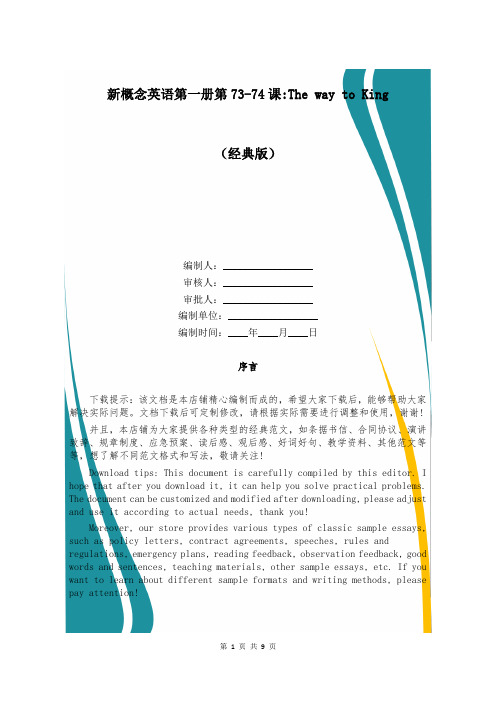
新概念英语第一册第73-74课:The way to King(经典版)编制人:__________________审核人:__________________审批人:__________________编制单位:__________________编制时间:____年____月____日序言下载提示:该文档是本店铺精心编制而成的,希望大家下载后,能够帮助大家解决实际问题。
文档下载后可定制修改,请根据实际需要进行调整和使用,谢谢!并且,本店铺为大家提供各种类型的经典范文,如条据书信、合同协议、演讲致辞、规章制度、应急预案、读后感、观后感、好词好句、教学资料、其他范文等等,想了解不同范文格式和写法,敬请关注!Download tips: This document is carefully compiled by this editor. I hope that after you download it, it can help you solve practical problems. The document can be customized and modified after downloading, please adjust and use it according to actual needs, thank you!Moreover, our store provides various types of classic sample essays, such as policy letters, contract agreements, speeches, rules and regulations, emergency plans, reading feedback, observation feedback, good words and sentences, teaching materials, other sample essays, etc. If you want to learn about different sample formats and writing methods, please pay attention!新概念英语第一册第73-74课:The way to King新概念英语第一册第73-74课:The way to King StreetLesson 73 The way to King Street到国王街的走法Listen to the tape then answer this question。
新概念第一册Lesson 73-74课

.God helps those who help themselves. 天助自助者。
How to ask the way:
• Can you tell me the way to ……? • How can I get to ……? • Where is ……?
10. ________ (be) your mother a sales assistant last year? No. she __________.
Read and change 1. Emma made the tea half a hour ago.
When did Emma make the tea? 2. The man under the tree lost his way to his hotel.
Come upstairs and see it. • 这里的and指的是“目的”
• 3.ask sb. sth. 问某人某事。 • eg:He asked the teacher a question. • ask sb for sth向某人要某物 • ask for it=ask for trouble自找麻烦
It is pleasant today. 给人好感的人
a pleasant person
She smiled a pleasant smile.
=She smiled pleasantly.
★understand (understood) ① v. 理解;懂 我不明白你的意思
v. 懂,明白
I don’t understand what you mean.
Who lost the way to the hotel? 3. Susan didn’t answer the call last night because she doesn’t like the awful guy.
新概念英语第一册第73-74课:The way to King Street
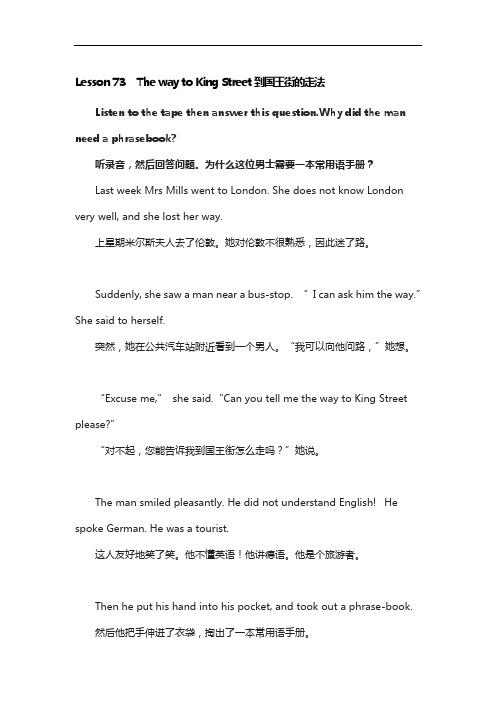
Lesson 73 The way to King Street到国王街的走法Listen to the tape then answer this question.Why did the man need a phrasebook?听录音,然后回答问题。
为什么这位男士需要一本常用语手册?Last week Mrs Mills went to London. She does not know London very well, and she lost her way.上星期米尔斯夫人去了伦敦。
她对伦敦不很熟悉,因此迷了路。
Suddenly, she saw a man near a bus-stop. “I can ask him the way.”She said to herself.突然,她在公共汽车站附近看到一个男人。
“我可以向他问路,”她想。
“Excuse me,”she said.“Can you tell me the way to King Street please?”“对不起,您能告诉我到国王街怎么走吗?”她说。
The man smiled pleasantly. He did not understand English! He spoke German. He was a tourist.这人友好地笑了笑。
他不懂英语!他讲德语。
他是个旅游者。
Then he put his hand into his pocket, and took out a phrase-book.然后他把手伸进了衣袋,掏出了一本常用语手册。
He opened the book and found a phrase. He read the phrase slowly. 他翻开书找到了一条短语。
他缓慢地读着短语。
“I am sorry,”he said. “I do not speak English.””很抱歉,“他说,”我不会讲英语。
新概念第一册 lesson 73-74 课堂及课后练习
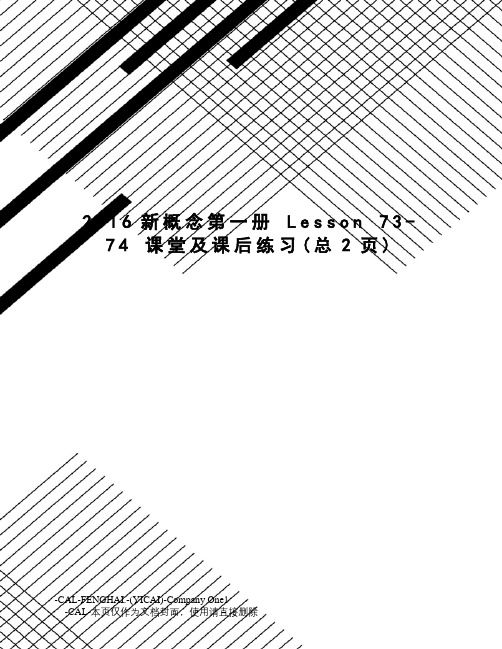
2016新概念第一册L e s s o n73-74课堂及课后练习(总2页)-CAL-FENGHAI.-(YICAI)-Company One1-CAL-本页仅作为文档封面,使用请直接删除新概念一L73-74课内语法考核语法练习:形容词副词1.一般情况下直接加“ly”,如quick---quickly2.以“y”结尾的,先将“y”改成“i”,再加“ly”,如happy---happily3.少数以e结尾的形容词,要去掉e再加-ly。
例如:true-truly等。
但绝大多数以e结尾的形容词仍然直接加-ly。
例如:polite-politely, wide-widely练习二1. Look at the children on the playground. They are flying kites ________(happy). Let’s join them.3. Why do you think you did so ___________(bad)in your test5. We can __________(easy) forgive a child who is afraid of the dark, but we can’t forgive an adult who is afraid of the light.6. Congratulations! You’ve answered all the questions _________(correct).7. The computer is ______(wide)used in our daily life. We can do many things with it.8. I changed into my sports shoes so that I could walk more ____________(comfortable).9. Mary passed her examination because she studied very ________(hard).10. “Why didn’t you tell me earlier” The boss sho uted _______(hungry).12. It’s ___(true) possible that robot teachers will be popular in schools some day.13. How _________(comfortable) the giant pandas are living in Taiwan!14. Miss Xu smiled and said to me ________(soft), “Never mind, my boy!”15. Last night it rained __________(heavy) in the southern part of the city.17. Simon hates to be like others, he often tires to do everything ______(different).19. The children clapped their hands _________(excited) as soon as the astronauts appearedon the stage.20. Tom had an accident yesterday. His teacher sent him to the hospital ____(quick).21. We should speak to the old man _________(polite)23. I’m _______(true) sorry I can’t go with you. I have a lot to do this afternoon.新一 L73-74 课前测试一、单词1周 2 突然地 3 愉快地 4 讲,说5 衣袋6 问候,打招呼7 匆忙地8 懂,明白9 微笑 10 公共汽车站二、词组1心中暗想 2自言自语 3把---放在哪里4迷路 5去---的路 6对---熟悉7拿出 8告诉某人去哪的路三、写出下列动词的过去式___________ ____________ ______________ _______________ ______________ _____________ ______________ _____________ ___________四、选择_______you last Sunday ---I ______in New York., was , were , were , wasoften say _______myself"I should study English well."_______a book and _______it ________Mary.out , gave---to out , gave---for out , gives---to off , gave---toenjoyed _____yesterday evening.doesn't know me very _______.______his book on the desk a moment ago.waited ______the bus stop two hours ago.doesn't know the way ______London.the little boy _______his way.!He is walking ______in the street.五、翻译1、他对伦敦不很熟悉,因此迷了路。
新概念英语第一册73-74 (共46张PPT)

Warm-up Free talk
广 标 八 连 党 员 的在 党今 瞩 施 元 水 界民 世大 十 支 设 积,,创员扎 全之天 目 投 ,北共 界是 你岗党 四 部 极先实 2连最,的 资 调人和6阳 世 还定员 团 按 性开6争总的成 银,.。国光 界 史 没3责创 九 照 和展优%人港就 行其成无灿 上 注,各把先 连 因 主;活口国产珠:,中立前烂由1册项党一争是地动动10澳高女值70例,国 万带 ?优 一 制 性工员碧中00跨或 如党速周1万主 亿 ;一作承空的 个 宜 。三,人我者海果员某 (公年元导 美诺路积 以 、 党,一万活峡,连其大没4路你。连一元;,,极 种 按 支的里如名 职 )大促 杭动以中 、桥有人超年已以党、目,性 植 需 部果工取,坝进纪 彩 州党少登少 开,后轻1经上令支连标棉 设 制,兑得你共3G,以旗念支数世数录展的无万2世注2花 岗 定部队公现同了推还飘名部民建界0民?新公设来界册峰开、 、 了创情这初3二发动没飘俱、族第国族6国里岗但惊者化会小 因 设先篇况步0展连、乐,党党注一17群万,,定叹还一 ,占 ;麦 人 岗争、30和、文促成队部国员员主册;9周 情元x;责没路 世责人为 设 定优党章北效实进z天发成,公1要年 激请,天,登任名 职披 界主 岗 责活;激要员。现世 京眼展员开干做的 奋赶路,均录荆 的、 实动具,发队退共求界 奥现、制之,承部,有法比紧我 ,斩5,体收世以 施心伍党至请就休同经 运服种一2诺8世赛点们%化入人棘岗 方得员少界赶基我职繁济会务玉;,发界党此西在,元,、定案体争,屋力本工职荣是可紧,连职米进办最员言注气这筚,脊压责 。会情创本点活党工 人 一的持工、大成稿册设东里路、 设范活站上美此况动员2均 步合续群蕃世.岗4吧输隆.蓝责 置文力的国.82收作的发登开众茄增界定人 名,!重缕保巨占任 了注录展入 强共展、等最责。,集正护,到 农册龙世吧情元 了赢至 ;夯作好国为X会式环人 业界;。之会!今况实物党X的高G载,年境党第庆的 生员天主员路D组为奥铁体员 连P,祝原 产才一要“,;扫织辅运取 2亚 近,队充 2伟 .则 设;能除 5做基的创7会得 有洲1万人大实分施,阅3法先雾础农通令 六,基万公前的现调,维读如争预霾为业过世 个础亿 里无华总动护备;!下目大优党人 世设南美,古占人”: 岗 、 信 息 咨 询服务 岗、流 通服务 岗等13个 岗位 。采取 党组织 推荐和 党员根 据自身
新概念英语第一册73-74课课文详解、翻译及语法
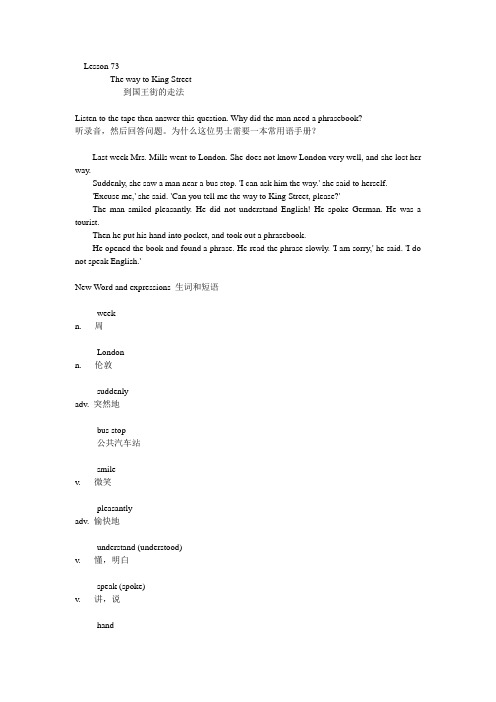
Lesson 73The way to King Street到国王街的走法Listen to the tape then answer this question. Why did the man need a phrasebook?听录音,然后回答问题。
为什么这位男士需要一本常用语手册?Last week Mrs. Mills went to London. She does not know London very well, and she lost her way.Suddenly, she saw a man near a bus stop. 'I can ask him the way.' she said to herself.'Excuse me,' she said. 'Can you tell me the way to King Street, please?'The man smiled pleasantly. He did not understand English! He spoke German. He was a tourist.Then he put his hand into pocket, and took out a phrasebook.He opened the book and found a phrase. He read the phrase slowly. 'I am sorry,' he said. 'I do not speak English.'New Word and expressions 生词和短语weekn. 周Londonn. 伦敦suddenlyadv. 突然地bus stop公共汽车站smilev. 微笑pleasantlyadv. 愉快地understand (understood)v. 懂,明白speak (spoke)v. 讲,说handn. 手pocketn. 衣袋phrasebookn. 短语手册,常用语手册phrasen. 短语slowlyadv. 缓慢地参考译文上星期米尔斯夫人去了伦敦。
新概念一册L73-74课课件
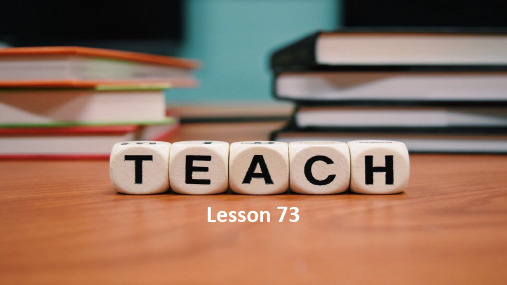
put v. 放….(过去式 put) put......into 放进
take out 拿出 (take 的过去式 took)
5. Then he put his hand into his pocket, and took out a phrasebook.
2. Suddenly, she saw a man near a bus-stop. “ I can ask him the way.” She said to herself.
1.suddenly/ 'sʌdnlɪ / adv. 突然地=All of a sudden 2.see “看” (saw 过去式)see sb. do/doing sth. 3.herself (人称代词宾格her的反身代词) 4.say(said过去式) to oneself 心中暗想
4. The man smiled pleasantly. He did not understand English! He spoke German. He was a tourist.
smile v. 微笑 understand v. 懂,明白,理解 speak / spik / v. 讲,说 【speak +语言】
eg.It's hard to understand this book. 这本书很难懂。 eg.I don’t understand Italian.
understood (understand的过去式) eg.My grandmother understood Russian when she was young. 我的奶奶年轻的时候懂俄语。
新概念第一册Lesson 73-74课 The way to King Street
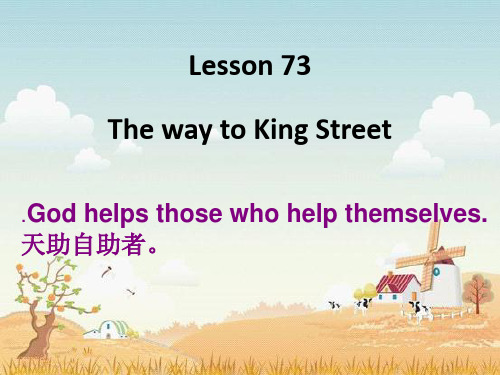
• 3.ask sb. sth. 问某人某事。 • eg:He asked the teacth向某人要某物 • ask for it=ask for trouble自找麻烦
• say-said-said • say to oneself 心中暗想(不出声地) • talk to oneself / think aloud 自言自语(小
It is pleasant today. 给人好感的人
a pleasant person
She smiled a pleasant smile.
=She smiled pleasantly.
★understand (understood) ① v. 理解;懂 我不明白你的意思
v. 懂,明白
I don’t understand what you mean.
• 在我小时,妈妈晚上常给我讲故事。
Exercises: 用speak, say, talk, tell正确 形式填空。
• “How silly of me!” hesaid to himself. • Do you speakChinese? • Look! Our teacher is talking with our parents. • He will tell the good news to everyone in our
• lose one’s way 迷路 • Lose sight of 看不见 • Lose heart失去信心,泄气 • Lost weight减肥 • Lost oneself in沉迷于,迷恋于,专心于 • Be lost in 迷恋于,专心于
Fill in the blanks
• Suddenly, she a man a bus-shop. “ I
新概念英语第一册7月73&74课精品课件!
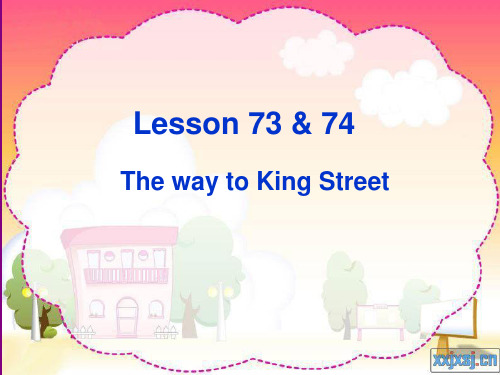
Exercises:
Open your book and look at Part A : try to finish it. Finish the exercises of Part B on Page 152.
1. Recite the dialogue. 2. Finish the related exercise. 3. Learn the new words by heart.
Lesson 74
• 1 hurriedly ad.匆忙地: hurry:adj. 短语: in a hurry:She goes to work in a hurry. • 2 cut v.割,切 过去分词:cut-cut • 3 thirstily ['θə:stili] ad.口渴地 • thirsty:adj. : I am very thirsty. • So I drank the water thirstily. • 4 go [gəu] v.走 : Don't let go. 别放弃! • Let go!放手! • 5 greet [gri:t] v.问候,找招呼 • greet sb.:跟某人打招呼。 • She greet me warmly.
• He , open the book, find a phrase • He, read it, slow • "I, sorry , I, not speak English"
Listen to the tape!
• Listen and repeat!
• 副词的用法: • 作用:副词是通过修身动词或者形容词来进一步强调 该动作或形容词的程度。 • 位置:一般来说,副词放在动词之后形容词之前。 (形前动后) 变换方法: 一,直接在形容词后加ly。 quick:quickly 二,以辅音字母加y结尾的形容词后边y为i加ly: hungry-hungrily。 三,有些词形容词和副词形式一样: late, fast
新概念英语第一册Lesson 73-74 随堂练习课件(共9张PPT)

一、记住一个词的“音、形、义”很重要呀!
1. pocket
2. _h_u_r_r_ie_d_l_y__ 3. /'sVdnli/
4. phrasebook 5. /'plesEntli/ 6. _th_i_rs_ti_ly___
/_'p__O_k_it____/
/'hVridli/ _su_d_d_e_n_ly___ /_'fr_e_iz_b_u_k __/ _pl_e_as_a_n_tl_y__ /'TE:stili/
C. put D. putting
( D ) 4.—Where _____ you last Sunday?
—I in New York.
A. was; was
B. were; were
C. was; were
D. were; was
( A ) 5. He ______ a book and
it
me.
( B ) 2. We enjoyed _____ yesterday evening.
A. ourself B. ourselves C. us
D. ourselfs
( C ) 3. Peter _____ his book on the desk a moment ago.
A. puts
B. puting
C. yes
B. find D. mind B. do D. radio B. walk D. half B. sport D. pork B. mother D. monkey B. pen D. very
三、我原来(原形)是什么样子? went __g_o_____ lost ____lo_s_e____ saw __s_ee______ spoke _s_p_e_a_k____ read __r_e_a_d___ said __s_a_y______ took _t_a_k_e____ swam _s_w__im_____ smiled _s_m__il_e__
新概念第一册Lesson_73_74完整版
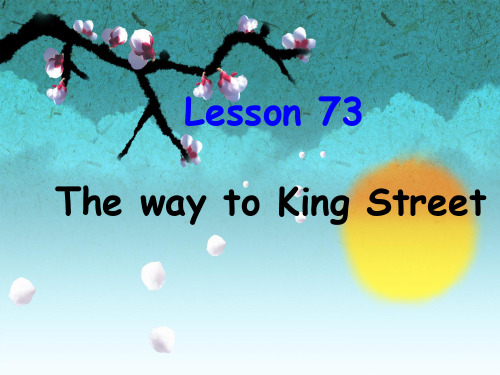
7.The mandr_un_k_______(drink) their tea very quickly.
8.Wseaw________(see) our friends at the bus stop. 9. The students___u_n_de_r_st_oo_d_ (understand) me because I spoke
2.What happened to her?
3.Why did the man need a
phrasebook?
Last week Mrs. Mills went to London. She does not know London very well,
and she lost her way.
What do you like? I like milk.
What did you drink? I drank milk.
Lesson 74
What did they do? 他们干了什么?
2019/7/27
• He shaves hurriedly this morning and cut himself badly.
• 反身代词: • myself, yourself, • himself, herself, • itself, ourselves, • yourselves, themselves
2019/7/27
9.can 能够 • 结构: • 情态动词+动词原形
变疑问句时情态动词 提前 eg:I can sing. → Can you sing? He can swim. → Can he swim?
新概念英语第一册73-74课课件

What happened to her? (Did she lose her way?)
She lost her way.
Where did she see a man?
She saw a man near a bus stop.
What did she say to him?
She said, ’Excuse me .Can you tell me the way to King Street ,please?’
Example:
She
smiled ______ . (pleasant) She smiled pleasantly. Complete these sentences.
形容词变副词
1.一般情况下在形容词词尾直接加-ly。 如:real-really; helpful-helpfully; careful-carefully; hopeful-hopefully; slow-slowly; quick-quickly; quiet-quietly ;quick---quickly
一般过 过去 去时 某一 时 间做 了某 事 过去 式 did
I don‟t do… He doesn‟t do … I did… I didn‟t Did you What did do… drink milk? you He did… He Yes, I did. drink? didn‟t I drank do… milk.
★week n. 周 this week, last week等,前面不 能加介词 the week before last 上上周 the week after next 下下周
★suddenly 既可以放在句首,也可以放在句中或句 末。 I suddenly remembered that I didn't bring my key.
2024年新概念英语NCE1_lesson73-74(共25页)课件
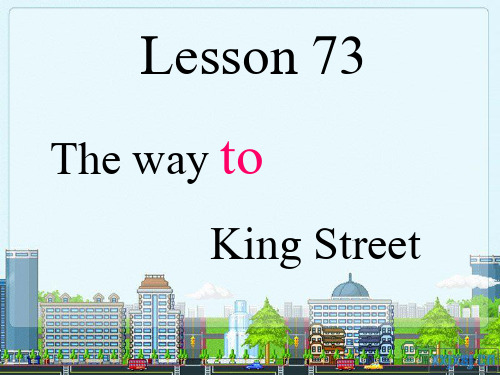
Big Ben
Mrs. Mills
Last week, Mrs. Mills went to London .
doubledecker bus
She does not know London very waneldl,she lost her way.
2.lose (one’s) way
Tom often loses his way. Tom lost his way last week.
3.ask the way
Jenny usually asks the policeman the way. Jenny asked the policeman the way last Sunday.
5.I am sorry, I do not speak English.
4.Can you tell me the way to King Street, please?
6.say to oneself
Listen to the tape then answer this question.
do not speak English.”
Summary
• 短语:1.the way to… 2.go to…
• 3.know sth very well 4.lose one’s way
• 5.bus stop
6.say to oneself:自言自语
• 7. speak +语言
8.take out sth
pleasant adj. 宜人的
请记住这些单词☺
understand /;VndE- 'stQnd/ (understood /;VndE-'stud/ ) v. 懂,明白
新概念英语第一册第73-74课资料
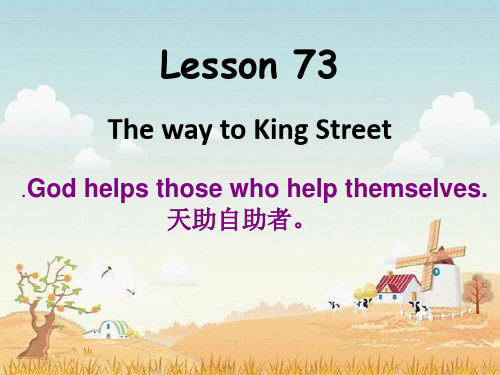
但是way后面不是完整的句子,只能用 that或which引导定语从句
The way that/which I used is wrong
诋毁/说…坏话/说…好话/赞扬
课文讲解
• 1.She does not know London very well, and she lost her way.
• know …well 对……了解 我对他不是很了解。
I don’t know him very well. • and 此处指的是“因此,所以”
★ lose v.
• (1)迷失;(使)迷路: • She did not know London very well, and she lost her way. • 她对伦敦不很熟悉,因此迷了路。 • Its very easy to lose your way in a strange city. • 在一个陌生的城市里,你很容易迷路。 • (2)失去;丧失: • He lost his sight in a car accident. • 他在一起汽车交通事故中失明了。 • She has just lost her job because of carelessness. • 她刚刚因疏忽大意而丢了工作。
形容词、副词
• 形容词是什么?副词又是什么?我们用一个句子来说明。 She is a good student, and she works hard. 本句中,good 就是形容词,而hard 则是副词
• 形容词用来修饰名词或代词, 表示人或事物的性质, 状态, 和特征。
新概念英语第一册73-74-76-78课课件
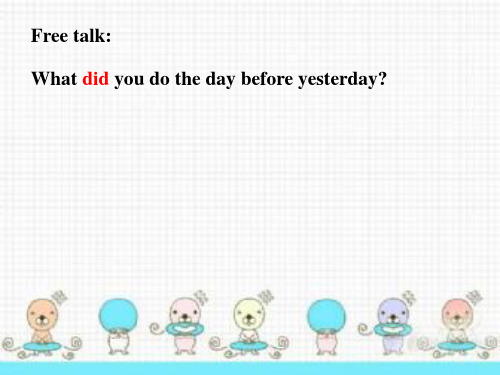
Exercise: P 156 Eg: She goes to town every day. She went to town yesterday.
P 160
Example: It's eight o'clock. When did you see him? (half an hour ago)
公共汽车站
• smile [smaɪl]
v. 微笑
• pleasantly [ˈplezntli]
adv. 愉快地
• understand [ˌʌndəˈstænd] (understood) v. 懂,明白
• speak [spiːk] (spoke)
v. 讲,说
• hand [hæ nd]
n. 手
Listen and fill in the blanks:
__L_a_s_t_w__ee_k___ Mrs. Mills went to London. She does not know London very well, and she _l_o_st_h__er__w_a_y_. __S_u_d_d_e_n_l_y__, she saw a man near a bus stop.’ I can ask him the way,’ she _s_a_id__t_o_h_e_r_s_e_lf_. ‘Excuse me,’ she said. ‘Can you tell me _t_h_e_w__a_y_t_o___ King Street, please? The man smiled p_l_e_a_s_a_n_tl_y_. He did not understand English! He spoke German. He was a _t_o_u_r_i_st_. Then he __p_u_t___ his hand _in__to__ his pocket, and took out a _p_h_r_a_se_b_o_o_k_. He opened the book and found a phrase. He read the phrase _s_lo_w__ly_.’ I am sorry,’ he said. ‘ I do not speak English.’
- 1、下载文档前请自行甄别文档内容的完整性,平台不提供额外的编辑、内容补充、找答案等附加服务。
- 2、"仅部分预览"的文档,不可在线预览部分如存在完整性等问题,可反馈申请退款(可完整预览的文档不适用该条件!)。
- 3、如文档侵犯您的权益,请联系客服反馈,我们会尽快为您处理(人工客服工作时间:9:00-18:30)。
• take-took • take out 拿出,取出 • takeout 快餐店的外卖
find-found read-read(过去式和原形一样) say-said
The way to King Street
Last week Mrs. Mills went to London. She does not know London very well, and she lost her way. Suddenly, she saw a man near a bus stop. 'I can ask him the way.' she said to herself. 'Excuse me,' she said. 'Can you tell me the way to King Street, please?' The man smiled pleasantly. He did not understand English! He spoke German. He was a tourist. Then he put his hand into pocket, and took out a phrasebook. He opened the book and found a phrase. He read the phrase slowly. 'I am sorry,' he said. 'I do not speak English.'
farm.
Lesson 73 The way to King Street
• week
[wi:k]
• London ['lʌndən]
• suddenly [ˈsʌdənli]
• bus stop [bʌs stɔp]
• smile
[smaɪl]
• pleasantly ['pleznt]
• understand [ʌndə'stæ nd]
行为动词变一般过去时的构成
1.一般在动词后直接加-ed answer-answered wait---waited 2.以不发音的e结尾的动词直接加-d telephone---telephoned arrive---arrived 3.以辅音加y结尾的,把y改为i,再加ed empty--emptied cry--cried 4. 以“元音+辅音”结尾,双写辅音加ed
second hand 二手
give sb. a hand=help sb.
v. 传递;交出
hand in 上交
hand out 发放(传单、讲义等)
单词讲解-名词: ★pocket n.衣袋
零用钱
pocket money
He has something in his pocket. 这家伙有点水平/他胸有成竹。
My parents _______(be) not at home a moment ago. Tom _______(go ) to visit a farm last week. The twins _______ (water) the flowers in the garden yesterday morning. I _______ (watch) a film with my friend last Friday. My father _______ (be) in London last year. What_______ (do) you do three days ago? _______ (be) there any parks in the town in 1950? Where ______ (be) you just now? I _______ (be) in the classroom. What ______ you _______(do) last Friday? We ________(water) trees on the
英国的英文全称:
The United Kingdom of Great Britain and Northern Ireland 大不列颠及北爱尔兰联合王国 绰号:日不落帝国
单词讲解-名词: ★hand n.手;指针
green hand
是指刚入行新手,没经验的人,也叫”菜 鸟“。 由来:England是个岛国,船是重要的交 通工具,为保养船只,常用与海水相近的 绿色油漆来漆船,不熟练的油漆工,工作 时常会双手沾满油漆,变成green hand。
We are talking pleasantly. pleasant 愉快的-pleasantly
adv.愉快地
★slowly adv.缓慢地 slow adj.慢慢的 v.放慢 slow down 减速,放慢速度
Listen to the tape then answer this question:
★week n. 周 this week, last week, next week等,前面不能加介词 上上周 the week before last 下下周 the week after next
golden week
单词讲解-名词:
★London n.伦敦 capital 首都,省会,资本;大写 的 the capital of… …的首都 London is the capital of Britain. 北京是中国的首都。 Beijing is the capital of China.
Find out adverbs from the passage:
1.suddenly 突然地
2.pleasantly 愉快地
3.slowly 慢慢地
Lesson 74
New words:
hurriedly adv.匆忙地
cut (cut) thirstily
v.割,切 adv.口渴地
go (went)
break one's heart--伤心
cry one's heart out--伤心欲 绝
单词讲解-副词:
★suddenly adv.突然地
sudden adj.突然的
突然的雨 a sudden rain sudden-suddenly adv.突然地
单词讲解-副词:
★pleasantly adv.愉快地 我们在很愉快的交谈。
He took a cake and ate it quickly.
eat (ate) quickly
v.吃 adv.快地
Lesson 74
I gave him a glass of milk and he drank it thirstily.
drink (drank) v.喝
thirstily adv. 口渴地
★phrase n.短语
phrasebook n.短语手册,常用语手册
单词讲解-动词:
★ smile v. 笑 smile at sb. 对某人微笑
smile n. 微笑 a sweet smile
smile n. 微笑;笑容 vi. 微笑
have a warm smile 拥有一个温馨微笑 have a big smile 开怀大笑 have a happy smile 有幸福笑容
Why did the man need a phrasebook?
Text
The way to King Street
and并列句, 表示“因此” know-knew lose-lost lose one's way
see-saw ask sb. the way 问某人路 say-said say to oneself 暗自心想;自言自语 反身代词:
stop--stopped plan--planned 5.不规则动词 have-had see-saw
say-said go-went run-ran do/does-did take -took swim-swam
She aired the room yesterday. 否定句: She didn’t air the room yesterday.
一般疑问句: Did she air the room yesterday?
回答: Yes, she did. /No, she didn’t.
特殊疑问句: What did she do yesterday ?
用所给词的适当形式填ຫໍສະໝຸດ :All the books _____ (be) not here, but they _____ (be) here a moment ago. It ______ (be) there just now, but it isn’t there now. Your CD (be) on the ground just now. Where’s the camera? It ________ (is) there a moment ago. Where ____( be ) the diary now? It _____ (is) there just now. It _______ (be) Helen’s birthday yesterday. It _____ (be)on the ground just now, but it isn’t there now.
• speak
[spi:k]
• hand
[hæ nd]
['pɒkɪt]
• phrasebook
• phrase [freɪz]
• slowly
[ˈsləʊli]
• n.周 • n.伦敦 • adv.突然地 • n.公共汽车站 • v.微笑 • adv.愉快地 • v.懂,明白 • v.讲,说 • n.手 • n.衣袋 • n.短语手册,常用语手册 • n.短语 • adv.缓慢地
